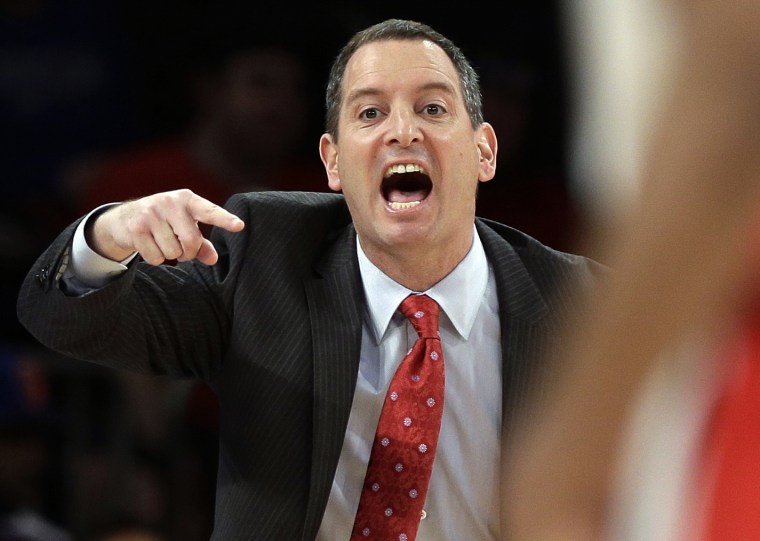By now, everyone has seen the video of former Rutgers men’s basketball coach Mike Rice raging on his players, which made the rounds from ESPN to Deadspin to the TODAY Show, and finally, after about 48 hours of national coverage, got him fired. This morning, it was reported that athletic director Tim Pernetti is out as well.
Mike Rice is a jerk, drunk off some warped notion of tough-love and macho discipline. Huffing fumes from the stories of Bear Bryant and Bobby Knight, out of his mind with power he didn't deserve to wield, and inflicting that gross misinterpretation on college kids. And Pernetti had to go, because once you make the mistake of covering for somebody like Rice... you're culpable.
But there is a larger problem here than Mike Rice's embarrassing behavior: the college athletic system is broken. Rice isn't the only coach in sports like this, he probably isn't even the worst offender--he’s just the one who got caught.
The NCAA is an incredible revenue model, because: it’s indentured servitude. Student athletes in the major fund-generating programs and sports sign up to help create a product, and then watch everyone profit… except for themselves. They’re at the mercy of coaches and athletic directors, who have full control of their scholarships and their playing time. And should they--the workers–decide they’d like to ply their trade somewhere else, it’s the coach and the department that have to sign off.
Most people don’t realize scholarships aren't four-year contracts. There is no guarantee you’ll be on that basketball, football, baseball, hockey, soccer, swimming, or softball team after your freshman year. It’s a one-year lease that is essentially re-upped by the coach at the end of each school year. At any point the coach can decide you’re no longer worthy of that spot, and rip it from you. That leaves you–and your family –on the hook for everything from tuition to medical bills.
So these coaches, hired to strategize and recruit, who go into a home and tell somebody’s mother and father “I’ll take care of your child as if [he/she] were my own,” end up with enormous control over a number of lives. It takes a truly balanced man or woman to handle that much power. And Mike Rice isn’t the only one cracking under its weight.
I played for a bad coach - a kind of late-stage Bobby Knight, a deteriorating legend. I talked with great reverence to local papers, other coaches, and friends – I floated the tired platitudes, saying it was an honor to play for somebody who’d “won so many games” and “seen all the greats.” And I sat quietly as he teetered back and forth between eviscerating his players, stripping our confidence, and struggling to remember who we were, or what year it was. We were teenagers, we rationalized his failed leadership as a byproduct of "making varsity." But there were always other adults in the room, adults that should have known better. Still, nobody spoke up. It was years before I actually enjoyed playing basketball again.
Robert Barchi, the president of Rutgers University, and Tim Pernetti, the former athletic director are now facing the kinds of questions that sunk Penn State's Graham Spanier and Tim Curley: How much did you know? When did you find out? What took you so long? Simple questions, unless you have the wrong answers.
After all, this was not the first time anybody heard about what a Mike Rice-led practice was like. And it’s important to point out that he didn’t miraculously change into this type of coach when he landed in Scarlet Knight territory. He's always been a bully and a disgrace to the job. The difference is, when he was at Robert Morris, his teams were winning–so when people described him, they said things like:
"He is who he is. He wears his heart on his sleeve. He's passionate, he's fiery."
I didn't even have to make-up those cookie-cutter generalities as examples--that’s a direct quote from a reporter who covered him in his more successful years. Which shows you the kind of coded language we use to describe a “coaching style” when somebody is winning. That’s why Rick Majerus is celebrated as some excitable, goofy, prince of basketball–and we overlook the fact of what he has done in order to drive home a point on defensive positioning. Of course, Rick Majerus also won… a lot. Rice didn’t.
And now Barchi wants a pat on the back for doing the right thing. No deal. In a system where we give coaches near-absolute control, there has to be accountability--and not just from the coach. People like Rice shouldn't be fired because their bully tactics became bad PR for the University. They should be fired because they’re unfit to handle the power they’re given. And until we fix that power balance, college administrators are next on the block.
Finally, the most bizarre byproduct of this story is this weird backlash of man-making creation myths being released into the atmosphere - decrying the “Wussification of the American Male.” It's the classic victim's mentality of rationalization - an attempt to make it the status-quo, so it seems "normal." They say writers and reporters (like me) don’t know what it’s like to be on a real team, and then harken back to some golden era, when people suffered their abuse in silence. Like, you know–the Second Mile kids. Well I’m not drinking that Kool-Aid: there was no “Gipper,” 80’s basketball looked prettier because the defenders were marginal athletes, and if your coach was calling you a “fairy” and knocking you in the dirt, he was a jerk and should have been fired, too.
These types of "leaders" didn't make a man out of you. You either grew up to be a good person because you made the right choices in life, or you didn't - so you’re not. In which case, well, I just hope you’re not coaching.
